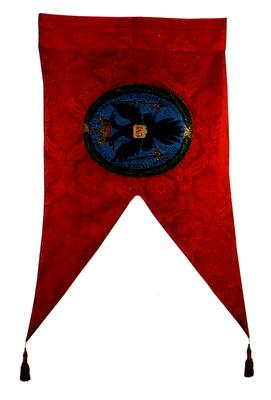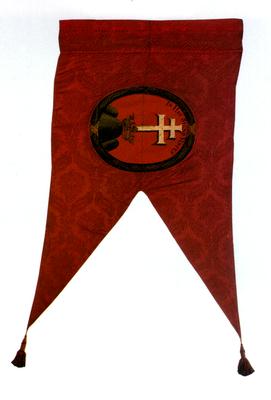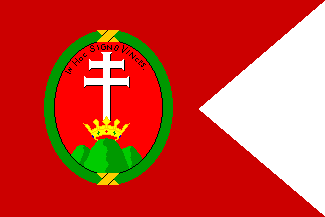
image by Željko Heimer , 14 July 2000

Last modified: 2010-01-16 by dov gutterman
Keywords: krizevci | korpivnicko-krizevacka | cross |
Links: FOTW homepage |
search |
disclaimer and copyright |
write us |
mirrors

image by Željko Heimer , 14 July 2000
See also:
City of Križevci - The coat of arms of Krizevci
originates from at least 18th century. It is canting, since the
name refers to the cross (city is named in Latin Crux, German
Kreutz and Magyar Koros [Ko//ro:s]). It can be blazoned as Azure,
two hands proper clasping each other embowed, dexter armoured
Argent and sinister clead Or, holding a triple cross patte of the
second between in chief two mullets of the third.
The coat of arms was used more or less throughout in different
artistical redentions, differing maily in representation of the
outer ornaments. The current simple shield is adopted in early
1990's, in the same time as the flag is adopted for the first
time.
The flag is blue, ratio 1:2, with the Coat of Arms offset to the
hoist (my guess - the axis is 1/3 of the lenght from hoist). The
Coat of Arms is fimbrated in white line from the rest of the
field. The blue shade used is grayish, that is considered
traditional colour of the city.
The vertical flag is not reported. Presumably, it would have the
Coat of Arms vetiacally set and offset upwards - but that is only
a speculation, of course.
My images are based on the representations of the flag and Coat
of Arms on civic pages at <www.krizevci.hr>
where both obverse and reverse of the flag is shown (though
reverse is no different from what is considered normal
vexillologic practice).
Krizevci is situated in Koprivnicko-krizevacka County.
In Bjelovar-Bilogora County page there
is a describtion and pictured flag of former Bjelovar-Krizevci
county, 19th and early 20th century. The Coat of Arms of Krizevci
county is seen on the combined county
flag of 1903 at hoist side.
Željko Heimer, 14 July 2000
On the Križevci On-Line site in the news for October 2002
<www.krizevci.com>
it is mentioned that on the City Assemby session held on 1st
October 2002 it was adopted a decision that changes the coat of
arms and the flag of the City. Details of the changes are not
published there. After contacting the webmaser, he promised to
fill me in with more details, but explains that the intention is
to revert to the historical design of the coat of arms (and flag
accordingly). The historical CoA is similar to the one adopted,
approved and used currently, but in more ornate design including
crown above the shield etc. It was granted in 18th century. The
city wants to use that historical design, or at least one that is
closer to it then the current simple modernization. This was in
mid-1990's rejected by the central authorities that are to
approve the design (then a commission at the Ministry of
Administration, nowdays in the Ministry of Justice), but the city
authorities judge that they shall have more luck this time.
The previe of how the intended design would look like, probably,
one can see at <www.krizevci.hr>,
though I do not know if this is exact the design that was adopted
in October. However, the same page provides some interesting
historical backgound and some explanations of the Coat of Arms
charges in the first place. I sumarize: The city was established
in the early middle-age, in 1225 it becomes the seat of a county
and in 1245 it was granted the free royal city rights by ban
Stjepan, that was confirmed by king Bela IV in 1253. At times the
sessions of the state parliament were held there. The city was
developed as dual, the above mentioned became the upper town
(Gornji Križevac), while the lower town (Donji
Križevac) was granted civic rights in 1405, when it was also
fortified against Turks. The two compeeting cities were finally
united in 1752 by empress Maria Theresia, and therefore the
plural form of the name Križevci. At the time the city was
granted the coat of arms with tripple cross (canting for the city
name) with two arms holding it. One is armoured to represent the
former upper town that was under military giovernment and the
other is in civilian clotes for the mercantile lower town.
Križevci is the seat of the Greek-Catolic Bishopric for the
whole Croatia.
Željko Heimer, 20 Febuary 2003
On Krizevci symbols I can add info from [ern03] on Ministry of Administration
approval date: 21 February 1997. While the catalogue [ern03] include the drawing of the
flag (not photos, as for other cases) the exhibition itself did
not include the flag itself. Namely, as I reported, in 2002 the
city authorities decided that they are not satisfied with the
design and are thriving for adoptiong of an other one (I don't
know if they have decided which one yet). Consequently, they do
not use the 1997 design at all - and did not have or did
not want to send the 1997 flag to th exhibition.
The designer of 1997 design is mr. (magister of science) Zdenko
Balog.
Željko Heimer, 20 May 2003
The web site at <library.foi.hr>
include a project of digitazing of the regional journal Glas
Podravine, from its first issues in 1951.
- An
article from 1993 Includes a drawing of the Coat of Arms of
Križevci and a short note on its grant in 1752.
- An article
from 1996 includes otherwise unrelated article on political
issues in Križevci, where it is mentioned that the mayor was
writing some letters on the letterhead including the Coat of Arms
of the city (it is probably the one shown in the 1993 article
above...)
- Another article
from 1996 is on the history of Križevci, picturing a
historical Coat of Arms of the city, but also a story on why the
triple cross is the city symbol. Namely, the triple cross became
the city symbol in 1752 when the two cities (civil and
military/upper and lower town) merged into one. The symbol of
upper town was a simple cross, while the symbol of the lower town
(military fort) was a double cross. According to one of the
legends, the name of the city derives from these symbols. The new
joined city received the joined - triple cross held by a civil
and military arms. Or so it is said...
- Another article
from 1996 has a long story on the dispute over the adoption
of the Coat of Arms of Križevci - namely the local assembly
insists on having a crown over the shield, even if the state
regulations explicitly prohibit that. The article writes
ironically on how such fight by the local government is futile.
The designer of the new "crownless" Coat of Arms is
named, Zdenko Balog, a heraldrist from Križevci. Also here
is a story (apparently different from a previous one we had on
Križevci) taht the two cities for 4 centuries had quarel,
among other things, about the right to use one and the same seal
(coat of arms).
- Another article
from 1996 include a photo showing quite clearly the flags of
Koprivnica and Križevci used in mid-1990's. A tricolour (or
bicolour with horizontal fimbriation) flag of Križevci!
It is hard to speculate on the Križevci flag colour there -
blue over dark-yellow with white fimbriaton?
Željko Heimer, 11 August 2009
kc-kz.gif)
image by Željko Heimer, 14 July 2000


image from Croatian History
Museum site by courtesy of Jelena Borosak Marijanovic
The flag of the Krizevci County 1711-1740
Red silk damask, wood, brass, painted
90 x 152 cm, staff length 262 cm
Double edged cavalry flag with red and blue tassels at the ends.
Both sides of the flag field are decorated with painted heraldic
emblems. Obverse: in a red medallion edged with laurel wreath
Hungarian (?) coat of arms with the motto In hoc signo vinces
(Under this sign you will win). Reverse: in a blue medallion
edged with a laurel wreath a crowned double-headed eagle, bearing
a white shield with the initials of the ruler Charles VI (C VI)
on his breast. In his talons he holds the ruler's insignias, a
sceptre and a sword. Around the laurel wreath the inscription
reads: Deo Carolo VI patriae vexilum fidele inclitae nobilitatis
comitatus Crisiensis (To the divine Charles VI the flag of the
homeland, the nobility of Krizevci County known for their
fidelity). The flagstaff is spirally painted in red and white,
and ends in a brass foliate finial with the pierced initials CC
(Comitatus Crisiensis).
E. Laszowski donated the flag in 1927.
J. Borosak-Marijanovic, Zastave kroz stoljeca, Zagreb,
1996, catalogue number 33, page 113.

image by Željko Heimer, 24 September 1999
I have made an image of "idealized" flag . Also,
note that this flag was hoisted on a staff, just as we would
expect it, and is not intended for vertical hoisting as one could
wrongly assume from the photo!
Željko Heimer, 24 September 1999